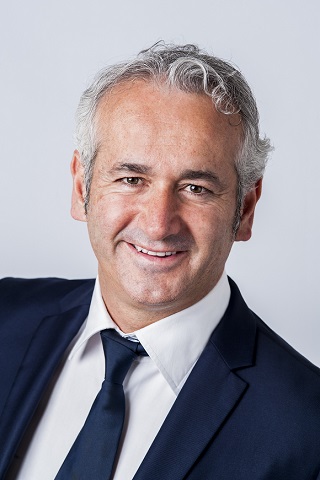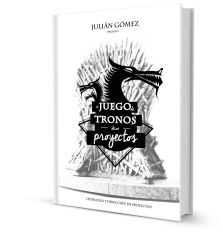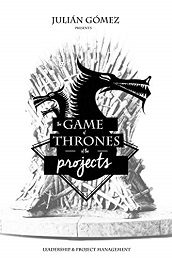17
2019
Interview with Antonio Nieto Rodríguez, the Czar of Project Management
Léelo aprox. en 9:54 minutos.
Today we dress up as a gala, as a champion of project management comes to our humble laboratory: Antonio Nieto Rodríguez. Taking advantage of the recent publication of his book The Project Revolution we have here one of the people who is doing more to make the top management recognize once and for all the value of project management. If I were you, I wouldn’t miss this interview, because otherwise you’re going to regret it.
Antonio Nieto Rodriguez, is one of the world’s leading experts in project management. He has published three books and several articles for Harvard Business Review. His work has been recognized by Thinkers50, the oscars of management, with the prestigious award “Ideas into Practice”. Member of the board of PMI, being its president in 2016.

Well, let’s go with the questions:
Julián: Reading the comments of your book on Amazon before buying it, there was one that caught my attention immediately that said that you are the Czar of Project Management. After reading the book, I think it is a most appropriate nickname because the book, above all, is focused on C-level, on top management, and less than top management is spoken to by a Czar. Is the great challenge to be faced by project management in the coming years, recognition and support by top management beyond talking about methodologies and tools?
Antonio: Hi Julian, first of all, it’s a pleasure to do this interview for your blog and thousands of followers.
I’m sure I’m not the Czar, but I appreciate the reference 😉 The fact is that since I started working in project management, my focus has been on top management. Mainly because at one point in my career, the lack of appreciation of the value of project management from the managers of the company I worked for, caused me to be fired. Since then, I have spent a lot of time studying this great challenge of convincing executives of the value of our profession.
Drive your projects to success
On your question, I totally agree, we must continue to influence the top management of the importance, not only strategic, but also vital, of the projects.
And the best way to convince is with results. In spite of all that we have advanced in terms of knowledge, methodologies, tools, almost half of the projects fail.
Julián: Agile methodologies and the lean approach have made canvas fashionable in recent years. We start with the business canvas, we continue with the team canvas and within the book describes a very interesting tool Project Canvas. It is so interesting that a methodology like PM² includes a similar one in its own definition the PM² canvas. Can you tell us a little bit about how the idea came about and when we’ll see it in the Pmbok? In version 7 maybe? 😉
Antonio: For me, one of the reasons for the success of the agile movement is its simplicity: on a sheet of paper they described a large part of its methodology and basic principles. If you see the latest version of PMBOK, it has 759 pages, including the new agile guide. I think the comparison needs no further explanation.
When I started working on my new book, The Project Revolution, one of the main objectives I set myself was to make it fun, easy to read and to explain project management techniques through real projects. If you look, most of the books on Project Management, if not all, talk about methodologies, tools, … and are very complicated for people not close to our profession.
The idea of Project Canvas came to me in one of the talks I have from time to time with Alexander Osterwalder and Yves Pigneur, the creators of the Business Model Canvas. I thought that if they had managed to put an entire business model on a sheet of paper and sell the concept all over the world, the same could be done with the projects.
I don’t know the PM² methodology, but it’s great that I have a canvas too. Anything that’s simple helps us explain what we do to more people.
So far my Project Canvas has been very well received and is already being used in several companies to monitor and analyze their projects.
And of course, I hope that PMBOK version 7 will include a similar canvas.
Julián: I remember that when I had the pleasure of meeting you in the IV Conference on Project Management organised by the Government of La Rioja, you commented on a case that caught my attention. It was the case of Philips and how it had changed from a product approach to a project approach. Rereading the case in your book automatically came to mind as in certain agile environments the product approach is supported rather than projects, but you can tell us why they are wrong?
Antonio: I still remember the days in Logroño, not only the talks, but also the excellent food they offered us.
My view on the dilemma of whether to focus on products or projects has changed since I spoke with the Philips manager. One of the flagship companies in Europe, which since its origins in Eindhoven had always sold products: first luminaries; then electric razors and brushes; and finally medical devices.
Despite being known worldwide, in the last decade Philips did not achieve significant growth while seeing fierce competition from Asia take its market by leaps and bounds.
To combat the competition, they decided to organize themselves in a different way. They realised that selling products was very limited, that in a good year they could sell 10 X-ray machines, and that it would take several years before they were bought back. However, if they started to sell projects, for example, the construction and management of a hospital, counting on other specialized companies, but they were leading the project, they could establish a commercial relationship with the client for 25 years.
Although it is not easy to find the project with which to sell your products, it is clear to me that the future lies in the projects. And that all companies that focus on products, sooner or later will be part of another company’s project.
Julian: There are many people who think that project management starts when the project manager takes the project they have just been assigned and starts working. Can we say that project management really starts before, in the strategy and in the definition of the portfolio? In the definition of what we are going to do and what we are not going to do?
Antonio: I totally agree Julian. The common practice is to think that the project begins when it is assigned to the project manager. It’s been like that for the last twenty years.
As you say, projects should start much earlier. In theory, the first thing is the definition of the strategy and objectives by the board of directors or the executives of the company. Once we have the vision, we look at the projects and ideas that are going to contribute to achieving those objectives.
It is also important to take into account the projects that are being carried out. In my years working as a project office manager, the portfolio of “ongoing” projects usually represents at least 80% of the total budget available for projects. So often the available capacity is much less than what people and managers think.
Another crucial point of view that I am developing is that often, because of the rush, or because of the need to start something new, companies are launched on projects ahead of time. And that leads to delay and even a lot of the failures we were talking about. I’m talking about a company’s ability to know when “a project is a project” (it’s an article I’m writing for Harvard Business Review).
I’ll give you an example to make it clearer. You knew that the idea of creating a Smartphone at Apple was presented to Steve Jobs in 2001, and despite thinking it was excellent, he said it was not the time to launch a project. To experiment with the concept, but that the focus of the company was elsewhere (iTunes and iPod). On November 27, 2004, three years later, Steve decided it was the right time to establish the project.
Of course it was a perfect project.
But what company waits three years to create a project of an idea with a lot of potential.
Amazing.
Julián: One of the things I liked most about your book was that you told without any shame about your failures. The truth is that I’m not glad that you’ve had some failures, but I’m glad how sincere you’ve been in telling it and thus be able to teach the lessons you’ve suffered in your own flesh to everyone else. Is there a lack of transparency when it comes to recognizing the error? Do we tend too much to deny the paternity or motherhood of the failure? Do we sin of perfection instead of showing our lessons learned?
Antonio: I think it depends a little on each one. But yes, you see more and more people talking about the failures, and how many times these were decisive in their careers. When they give you the bad news – in my case, they kicked me out of the company – you see everything negative and you tend to blame yourself for it, which affects your confidence. Once the time has passed, you see it differently. For me they have been the moments in which I have learned more about myself and to be clearer about what I wanted to dedicate myself to.
In the United States it is much more frequent to talk about failures and lessons learned. To the extent that in the field of start-ups, investors have more confidence in an entrepreneur who has failed than in one who has not.
I would encourage your readers to talk openly about their failures. Apart from bringing them closer to people and making them more human, it is a unique opportunity to learn and improve as a person.
Julian: There are two questions that you write down in the book and that I fully subscribe to. The first is that Project Management has a cost and the second is that Project Management is becoming Project Leadership. For me the first is related to communication, to communicate costs to those who do not see them, and therefore, both seem to me to encompass within the soft skills. Are the soft skills the new paradigm to be really dominated by the Project Director of tomorrow?
Antonio: Indeed, soft skills are the future focus of project management, if not already. The main problem today in projects is related to people. Motivation, commitment, aligning different visions and ways of working, team culture are critical issues in the success of a project. And what to say about what we call “stakeholders”, there are more and more, and each one with a different opinion about the project. To the extent that today the main determinant of the complexity of a project is the number of stakeholders, the more, the more complex the project is considered.
Of course we must not forget the technical parts, also fundamental, is the basis on which all project managers must support. The introduction of artificial intelligence will have a very important impact on this dimension of projects. According to Gartner, by 2030 80% of the tasks we know today as project management will be performed by robots and computers.
But to be a successful project manager with technical and soft skills is not enough. It is also necessary to have a strong sense and understanding of the company, of its strategy, of the benefits that the project will bring to the business.
Julian: And for the last one I leave you an easy question. A wish for the Project Management in the year 2020.
Antonio: As I explain in my book, I believe that we are at the beginning of the “project era” (I call it the Project Economy) and that in the next 10 – 20 years the importance of projects will continue to increase taking a major role not only in companies, but also in the public sector.
My wish for 2020 is that people working in project management continue to believe and prove their worth. They should also continue to develop their skills, not so much those of project management, but those of leadership and knowledge of the business. Finally, don’t forget the younger generations, it is important that we act as mentors to those who come after us, that we teach them what we know so that they can continue to change our world for the better.
Thank you Antonio!

Consigue Más de 100 Libros gratis
Suscríbete a nuestro newsletter por email y conseguirás Más de 100 Libros Gratis sobre Gestión de Proyectos, Innovación, Emprendimiento, Empresa, etc. directamente en tu correo
Últimos artículos de Julián Gómez (ver todos)
- El Último vídeo del viernes del año: Vuela como un dragón - hace 4 meses
- Ultimo video del viernes del año: Sé diferente - hace 1 año
- Vídeo del viernes: Kadenko, una luz en la navidad - hace 1 año











[…] Who is? […]